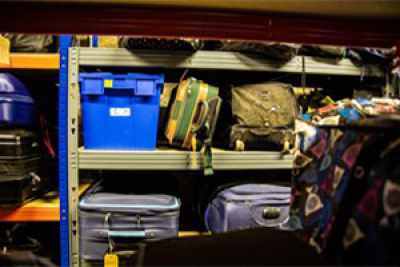ISIKLE’s Evaluation Exchange is a partnership between UCL and voluntary and community sector organisations in Camden and East London that aims to improve evaluation practice. This blog reflects the work Street Storage, the only UK charity providing storage to people experiencing homelessness.
Who are Street Storage?

Street Storage is the only UK charity providing storage to people experiencing homelessness in its own right. It is a small but rapidly growing organisation. Founded in 2018 by Rachel Woolf, the charity responds to a need that is very much neglected in the sector. Street Storage decided to join the Evaluation Exchange with the aim of learning about and embedding monitoring and evaluation (M&E) into their work. Run by a skilled yet skeleton team, and seeing a significant increase in demand post-pandemic, operational needs have been very dominant to date but the charity needs to move into a more professional way of working as they grow.
Context
The team was originally made up of four researchers with a range of disciplines and experience and two staff members from Street Storage. Alas, the team ended the Exchange with one researcher (Jasmine Cockcroft, PhD candidate in Psychology at UCL) and one staff member (Rachel Woolf, Director) but nevertheless has done their best to produce something of value. They started by trying to gain an understanding of how the charity is currently operating and what data they were collecting at the time. By their own admission, Street Storage were at a very early stage in terms of M&E and wanted to build in some processes to take forwards to guide future growth, report to fundraisers and aid in trustee/impact reporting.
Challenges

Street Storage had some useful data already on beneficiary numbers, gender, approximate location, languages spoken etc as well as outcome tracking, and an ad hoc system for collecting case study information. Despite this, the charity found methods of data/feedback collection challenging and as a result, had not prioritised this. Street Storage works with a very vulnerable community who may not wish to give personal information and are often mistrustful of systems. Often, people are overwhelmed and feedback is not a priority, nor did Street Storage want to be an organisation that forced people to fill out forms and surveys using technology they often could not access. People experiencing all forms of homelessness are often expected to repeat their traumatic stories to a range of services over and over, and there was a sensitivity around not asking too much, and allowing people to engage only as far as they felt comfortable. On the flipside, some were keen to engage and offered to help the charity by sharing how they had been helped as a way to give something back. It was down to the EvEx team to work out a way to balance these two positions for the benefit of the charity – and ultimately as a result – the homeless community benefitting from this service.
The EvEx Begins
The UCL team first gathered at the Street Storage offices to see how they operate and to get to know the staff on the ground. They met the very impressive Caroline Allouf, who manages referrals/outreach as well as all storage appointments and case work. She was currently recording stories, quotations and snippets of context from people as they were given to her and developing them into case studies when time allowed – but needed a more holistic and flexible way of managing feedback and proving impact. We had a useful time thinking of ways to collect information in a light touch and voluntary way while also helping to cover the currently austere walls, providing a more welcoming environment whilst also focusing on M&E!

A second creative brainstorming session led to a flow of ideas, including feedback on luggage tags stuck to the office walls, a giant map where people could pin their country of birth and sleep location, lunches for service users with a chance to discuss the impact the service has had on them and the potential of forming a group of service users who could be trained to interview others, creating video blogs and diaries of their journey with Street Storage and beyond. The team also discussed new ways to use Salesforce to collect statistical and quantitative data in a more professional way.
Putting down roots
With a clear overview of the context, challenges and goals, the team co-wrote a baseline document that captured the current picture and used the recently updated Street Storage strategic plan to identify relevant data collection against objectives and develop a format that could be easily updated on a regular basis to track progress to both trustees and funders. With this in place, and clarity on how to implement it and the impact this could have, Street Storage is now ready to take the next step. It will take a few months to see the fruits of this labour, but the charity now has a much better understanding of the nature of M&E and hopes to develop its practice and prioritise this as it grows.

